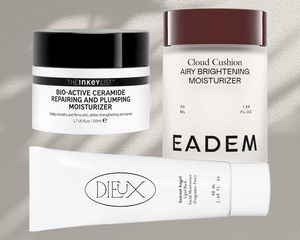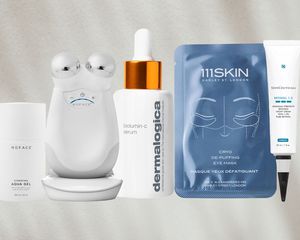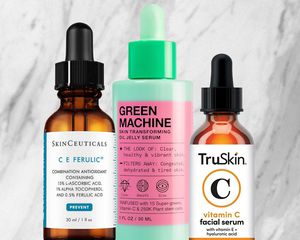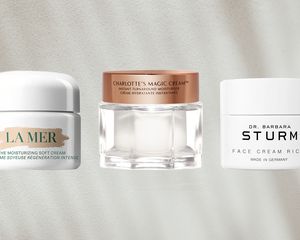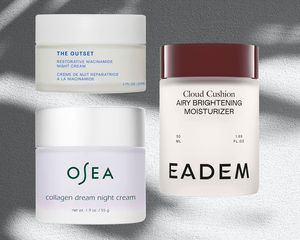:max_bytes(150000):strip_icc()/glossy-skin-5325b0c79c2b40e0a7ebd36059bb922d.jpg)
Stocksy
It might seem like every week there’s a new "it" oil on the block. We’ve had argan, rosehip, squalane, coconut, olive oil… the list goes on and on. But allow us to introduce you to the latest trending oil worth trying: sea buckthorn oil. If you’re looking for a moisturizing oil that’s heavy on antioxidants, this may be the one for you. We would even dare to say that sea buckthorn oil is the skincare ingredient that your skin has been missing. It may be a bold claim to make, but we think you’ll agree after learning about the benefits of this hero ingredient.
Meet the Expert
- Dr. Marisa Garshick, MD, is a board-certified dermatologist and clinical assistant professor at Cornell University.
- Dr. Orit Markowitz, MD, is a board-certified dermatologist and the founder of Markowitz Medical.
- Vanessa Coppola, FNP-BC, is a board-certified nurse practitioner and aesthetic specialist, as well as the owner of Bare Aesthetic Medical Spa.
To get the 411 on all things sea buckthorn oil, including how to use it and all the benefits, we enlisted the help of board-certified dermatologists Dr. Marisa Garshick and Dr. Orit Markowitz, as well as board-certified nurse practitioner Vanessa Coppola. Read on to discover all the details about this lightweight yet incredibly effective oil.
What Is Sea Buckthorn Oil?
Despite the name, sea buckthorn does not come from the sea. "Sea buckthorn (Hippophaes rhamnoides), also called a Siberian pineapple, is a flowering shrub or tree that produces berries which can be cold pressed into pulp or an oil," Coppola explains. "The plant grows in Europe, the Caucasus, Asia Minor and Central Asia, Siberia, China, and Tibet." One of the biggest reasons why it’s become so popular as of late? "It has been found that sea buckthorn plant berries carry 10 times more vitamin C than an orange and are the third-highest source of vitamin E among plants," Garshick says. Basically, sea buckthorn oil is the new glow-maker of your dreams.
Sea Buckthorn Oil
Type of ingredient: Hydrator and moisturizer
Main benefits: Provides hydration, evens out skin tone, and improves the appearance of fine lines and wrinkles.
Who should use it: Most skin types
How often can you use it: Once daily
Works well with: Most ingredients
Don’t use with: There are no known ingredients that it can’t be used with, though you should always pay attention to how a new product interacts with your existing routine.
There are studies that suggest sea buckthorn oil's effectiveness when ingested, but larger clinical studies are needed to solidify these claims. "It is hailed as having great antioxidant benefits, as well as having potential dermatological and other health benefits such as potential beneficial effects of the stomach, heart, and liver," Coppola explains. "These findings, however, need to be substantiated by further larger clinical studies. There has been ongoing research in the topical application of sea buckthorn oil in dermatological and cosmeceutical applications, which appears to be relatively safe and more effective in this regard than its oral formulation."
Benefits of Sea Buckthorn Oil for Skin
- Rich in antioxidants: If you’re looking to fight those pesky free radicals, sea buckthorn oil is worth adding to your routine. "It is rich in vitamin C, vitamin A, both alpha- and beta-carotene, vitamins B1, B2, and B6, vitamin E, fatty acids and flavonoids, Omega 3, 6, 9 and rarest Omega 7 and about 190 bioactive compounds," Coppola says.
- Moisturizes skin while regulating oil: Sea buckthorn oil also helps keep your skin nice and moisturized. "It can help as a moisturizing ingredient as it contains linoleic acid, which is found naturally in the sebum, so it may help to regulate moisture levels and overall help with hydration," Garshick explains.
- Improves skin tone: Sea buckthorn oil can also even out skin tone and fade post-inflammatory hyperpigmentation. "Sea buckthorn oil can improve overall skin tone and texture and overall skin elasticity," Garshick adds.
- Prevents moisture loss: Dry skin plus sea buckthorn oil equals a match made in heaven, thanks to the ingredient's ability to prevent moisture loss. "It helps to prevent trans-epidermal water loss, which helps the skin to maintain its lipid barrier," Coppola explains.
- Potentially anti-bacterial, anti-fungal, and anti-psoriatic: Coppola says studies are ongoing, but preliminary research suggests that sea buckthorn oil potentially has antibacterial, anti-fungal, anti-actinic, and anti-psoriatic properties.
- Decreases fine lines and wrinkles: Thanks to its rich antioxidant, fatty acid, and vitamin content, sea buckthorn oil can also help improve the appearance of fine lines and wrinkles. "It's an antioxidant and therefore has some anti-aging benefits," Markowitz adds.
- Helps tame oily hair: As a bonus, sea buckthorn oil can be used to help regulate oily hair and scalps. "It can be used in the hair to help eliminate excess oil without drying the hair out," Garshick says.
Side Effects of Sea Buckthorn Oil
Sea buckthorn oil is relatively safe to use, and most skin types should be able to use it without any problems. However, if you have acne-prone skin, you might want to test it out first. "There are no studies showing that it has a contact dermatitis or irritant dermatitis component," Markowitz explains. "While many oils can be irritating, I don't see any indication that you should avoid it. But of course, any oil based-product with a linoleic acid sort of fatty acid product within it may not be the best for acne-prone skin." Garshick adds, "While sea buckthorn oil is not known to cause acne, it is important to select a product formulation that is non-comedogenic, so it won’t clog the pores."
If you’re planning on getting any sort of surgery or facial treatment done, Coppola warns you might want to steer clear for a few weeks before your procedure. "Sea buckthorn oil has been shown in certain research inquiries to prolong bleeding and bruising, and therefore should be avoided before any invasive procedures by at least two weeks’ time to avoid any complications," she explains.
How to Use Sea Buckthorn Oil for Skin
Sea buckthorn oil is pretty versatile and can be used either alone or in moisturizers, eye creams, or oil blends. To use alone, add a few drops to your palms and apply as the step before your sunscreen in the morning or as the last step of your routine at night. "It is safe to use once per day," says Garshick. "Depending on the formulation it may be applied in the form of an oil that can be applied after a moisturizer to seal in hydration, or it may be incorporated into a cleanser, in which case it would be the first step in a skincare routine. If it is in the form of a serum, it is best applied after cleansing and prior to moisturizing."
Both Coppola and Garshick recommended this affordable sea buckthorn oil for your daily dose of moisture. "This 100% pure sea buckthorn oil is an affordable option to get the benefits of sea buckthorn oil, including moisturizing and antioxidant benefits," Garshick says. "It contains various fatty acids including palmitoleic acid, palmitic acid, stearic acid, oleic acid, linolenic acid, and linoleic acid, in addition to antioxidants including Vitamin E carotenoids and lycopene. Together, these ingredients help protect the skin against free radical damage while simultaneously improving dryness and helping to support the skin barrier. Not only does it leave the skin feeling soft and smooth, but it can also help improve overall texture and tone."
Garshick and Coppola both love this lightweight oil to help hydrate and smooth the skin. Garshick recommends using it daily after showering to lock in moisture. It can be used anywhere on the body, including the feet, to help soften skin.
This oil is another favorite from Garshick, who recommends it for anyone looking to reduce the signs of aging. "Sea buckthorn works to reduce dryness and hydrate the skin, while rosehip oil and bakuchiol together help to regulate skin cell turnover, improving the overall appearance of fine lines while minimizing irritation," she explains.
This lightweight face oil is incredibly easy to apply and uses the power of sea buckthorn in combination with buckwheat honey to simultaneously hydrate and soothe the skin. Garshick recommends using it alone, with a moisturizer, or even added to hair to reduce frizz and flyaways and improve shine.
